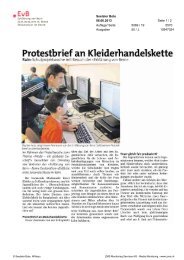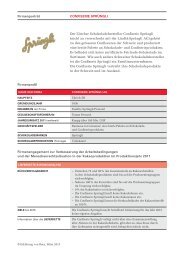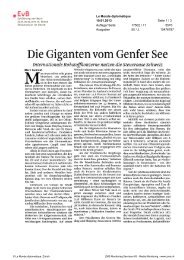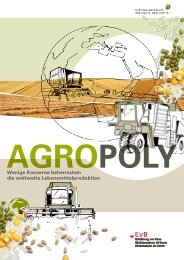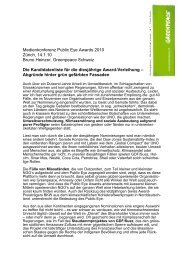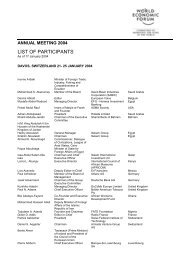Maid in India
Maid in India
Maid in India
You also want an ePaper? Increase the reach of your titles
YUMPU automatically turns print PDFs into web optimized ePapers that Google loves.
<strong>Maid</strong> <strong>in</strong> <strong>India</strong><br />
factories with promises of a well-paid job, comfortable accommodation, three nutritious meals a day<br />
and opportunities for tra<strong>in</strong><strong>in</strong>g and school<strong>in</strong>g. Clothes and household articles are also given to<br />
attract the parents. Send<strong>in</strong>g the girls to work <strong>in</strong> the mills where they will receive daily meals is a<br />
relief for the household; the (small) <strong>in</strong>come girls br<strong>in</strong>g <strong>in</strong> is a much needed addition to the means of<br />
the family. The lump sum offered to the girls is a way to meet the social pressure to purchase<br />
jewels for their daughters’ marriage.<br />
Workers are recruited through a network of brokers spread across the state of Tamil Nadu. Many<br />
factory bus drivers also act as brokers. In some cases, workers are employed through a labour<br />
agency. For their recruitment a broker will receive 500 to 1,000 Rupees (around €7 - €15) 16 for<br />
each worker he or she br<strong>in</strong>gs to the factory. Recruitment takes place throughout the year. A range<br />
of <strong>in</strong>centives, f<strong>in</strong>ancial and otherwise, are <strong>in</strong> place to motivate recruiters to br<strong>in</strong>g <strong>in</strong> new workers,<br />
especially dur<strong>in</strong>g production peaks. In order to conv<strong>in</strong>ce the girls and their parents, recruiters<br />
present the deal as attractively as possible. The promises are not written down and only once the<br />
girls enter the factories does it become clear that many promises will never be fulfilled.<br />
Workers are recruited from all over Tamil Nadu. The chances of local men and women to f<strong>in</strong>d<br />
employment <strong>in</strong> nearby textile and garment factories are decreas<strong>in</strong>g. Over the last year recruitment<br />
from other states has <strong>in</strong>creased. Migrants from Andhra Pradesh, Bihar, Karnataka, Kerala, Orissa,<br />
Manipur and Meghalaya are recruited to work <strong>in</strong> the Tamil Nadu sp<strong>in</strong>n<strong>in</strong>g mills and garment<br />
factories. A Tamil language newspaper article estimates that <strong>in</strong> Tirupur district alone the number of<br />
migrants from Northern states who work <strong>in</strong> the textile and garment factories exceeds 100.000. 17<br />
These workers often do not speak the local language and have no family or friends nearby whom<br />
they can resort to if they encounter problems. The dependency of the women workers on their<br />
employers has therefore <strong>in</strong>creased.<br />
16<br />
For this report the follow<strong>in</strong>g exchange rate has been used: 1 <strong>India</strong>n Rupee = 0.0153643 Euro (exchange rate of 14<br />
February 2012). The website www.xe.com was used <strong>in</strong> order to determ<strong>in</strong>e the exchange rate.<br />
17 “Th<strong>in</strong>athanthi” , 02.04.2012<br />
18




